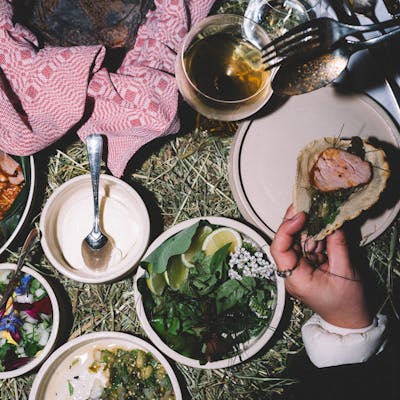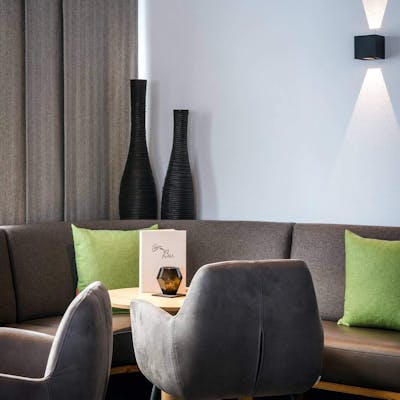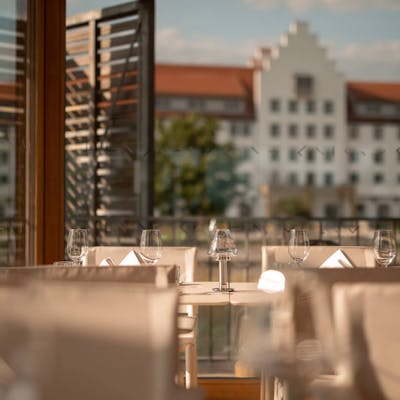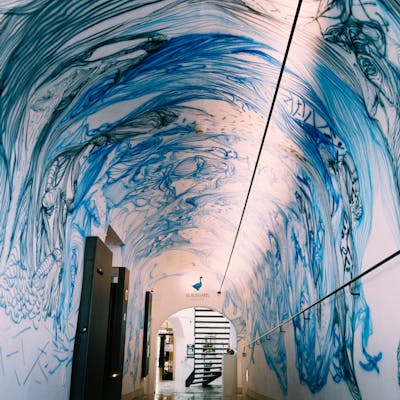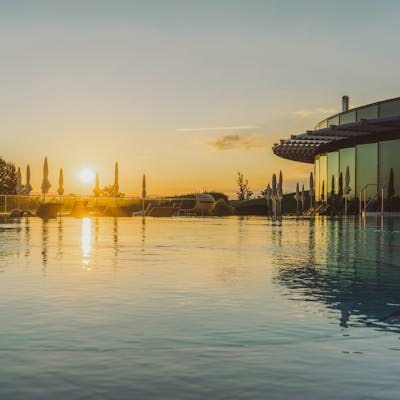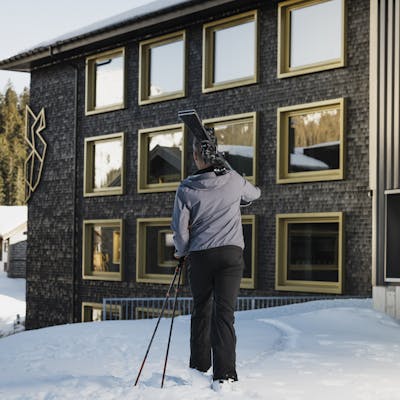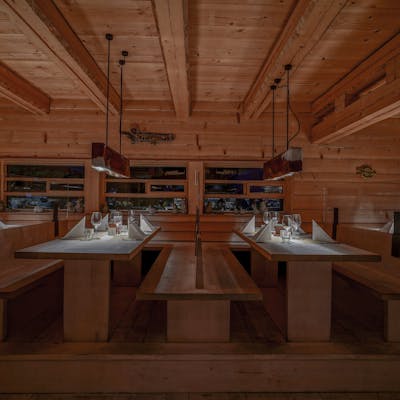

Clarity, depth of aromas, and sophistication – Matthias Schütz pays culinary homage to the region
Chef of the year 2021


The product is the hero on the plate – for chef de cuisine Matthias Schütz a regional focus is extremely important. Having grown up on his grandma and grandpa’s farm in Austria’s Wachau region he certainly does not feel this is just an empty phrase but rather the very essence of his cuisine. The shooting star who learned from the best has already won numerous prizes and now he is the newly elected winner of the Chef of the Year 2021 award from “Restaurant & Hotel Guide 2021”. His style – a healthy balance of down-to-earth and modern – shows influences of Thorsten Probost’s herb cuisine. No wonder, seeing as Matthias Schütz cooked with him for more than two years. From traditional inn to award-winning cuisine – the 36-year-old has seen it all. His last stop was Restaurant Seeplatzl by the Styrian Grundlsee lake where he demonstrated his talent in front of guests and critics alike. From now on guests at Griggeler Stuba in Oberlech’s Burg Vital Resort can enjoy his cuisine, which is focused on vitality, lightness, and freshness. He succeeds Probost and will continue to give gourmets an understanding of the Alps’ delicate aromas while continuing on his successful path of culinary excellence.
L.L. / Your culinary philosophy is that of focussing and reducing to the essential. Which ingredients can safely be left out and which absolutely can’t?
M.S. / My main focus is on the product. I’m not quite the purist Thorsten was because I enjoy a bit more texture on my plate. That’s why I like to use acidic elements, sauces, and, of course, herbs. That way I get a certain counterbalance on the plate.
L.L. / High quality ingredients are the basis of every good dish. What aspects are particularly important here?
M.S. / I look very closely at the choice of supplier. Simon Vetter, for example, from the organic farm Vetterhof, is an important partner. We’ve had the pleasure of hosting two events with him where we served his fresh vegetables – both raw and cooked. The eggplant was at the centre of attention while meat and fish played the second fiddle. And in order to be able to create a very vegetable-heavy menu we need a great number of different vegetables. Which is why we are also using the quiet time right now to carefully pickle and ferment. This way we’re already perfectly prepared for the high season in winter. Aside from the vegetables we also use herbs, seeds, and cones we picked and gathered in the spring to make ingredients. And when it comes to the question of how to best preserve them – in syrup or fermented – that’s where all the creativity of the profession comes in. Although the topic is most dear to us, we don’t just focus on regionality but also on seasonality. The ingredients simply need to go with the season. Artichokes, for instance, can really complement the one or the other dish in winter and we certainly like to use our stores of preserves from the summer.
That way I get a certain counterbalance on the plate.
The eggplant was at the centre of attention while meat and fish played the second fiddle.
L.L. / Which specific taste distinguishes Griggeler Stuba from the others?
M.S. / We try to really accent the product. Either by way of a combination with herbs or with pickled ingredients that have a certain acidity. This way fermented wild garlic adds a different kind of kick than a raw leaf on the plate would. I think it’s the conscious interplay of different components while always making sure the basic product’s taste remains recognisable that distinguishes us from others. It is our goal to underline a product’s specific taste, not cover it up. In order to do that we experiment a lot with herbs and use them for flavouring.
L.L. / Over the years you have worked in many different places. What has influenced your way of cooking? What have you brought with you from all those different places?
M.S. / As a young chef, when you’re in charge for the first time and want to create something of your own, you often pick the most revolutionary path. You want to be different from the others. When it comes to finding one’s style it’s important to get feedback from the teams you work with. And then your development automatically takes a certain direction. Do I really need ten different textures to ensure a tasty experience and digestibility? No, I like to focus on the essential – the product and the quality. Even if something is a feast for the eyes: if the taste isn’t right the entire dish is ruined. Thorsten Probost’s herb cuisine personally inspired me even though as chef de cuisine at Griggeler Stuba I did change a few nuances just to do my own style justice. I think that’s necessary, just to make sure the whole thing has a personal touch. After all, as time goes by you do want to be associated with Griggeler Stuba.
Although the topic is most dear to us, we don’t just focus on regionality but also on seasonality.
It is our goal to underline a product’s specific taste, not cover it up.
L.L. / A rarity among restaurants Griggeler Stuba does not have a menu to peruse before the meal. Instead, there is a surprise menu every day. How did you come up with this idea and how does one even surprise guests nowadays?
M.S. / We actually had to deviate a bit from the “carte blanche” surprise menu because today’s guests expect to have certain facts, because of allergies, for instance. So now we still don’t have a proper menu, but the basics are on there. We serve a lot of fish and vegetables. And if a guest is allergic to a certain ingredient a daily changing surprise menu is not ideal. Which is why we decided on a small menu with a small but exquisite selection of dishes – though it’s still not à-la-carte but rather a menu. We also make a point of asking our guests if there are intolerances to be able to suggest dishes or options that might not be on the menu.
I like to focus on the essential – the product and the quality.
Which is why we decided on a small menu with a small but exquisite selection of dishes.
L.L. / Griggeler Stuba has won more awards than most restaurants in Austria – so what should a guest bring to the table? Experience or curiosity?
M.S. / Our guests are open for new experiences, and they enjoy embracing the delicious possibilities of a cuisine that might be unusual for them. They do not need gourmet experience but rather look at the different flavour combinations with a childlike curiosity. We simply want people to have fun and enjoy their evening to the fullest.
L.L. / In your opinion: how has 21st century gourmet cuisine changed?
M.S. / All those different food trends have certainly had an influence on gourmet cuisine. For a chef that means asking yourself the question if a certain trend is relevant for your cuisine and if so how to best integrate it. I do, however, not think that we need to incorporate every single trend. Our own style is coined by experiences and inspiration. Which is why I like to find inspiration in books, magazines, and on social media. Travels and an exchange with colleagues and suppliers are inspirational, too. Thanks to our passion for seasonal products, we also come up with creations that were inspired by the producers’ input. Another thing that has changed is the dress code. Today you no longer need to wear a dinner jacket and tie to come to the restaurant. Things have become a lot more laid back and transparent. Transparency is key when it comes to the products, too. In the past people used to look at the neighbouring countries and import en masse and now regionality is at the focus. Which means that there are more producers and, consequently, a wider selection.



We simply want people to have fun and enjoy their evening to the fullest.
I do not think that we need to incorporate every single trend.
L.L. / Many toques, forks, points, awards and now the Chef of the Year: what do all these awards mean to you?
M.S. / They are a seal of approval, and I am proud of them. But I don’t want to attach too much importance to them either. I definitely do not want to rest on my laurels and end up standing still. That would be the wrong approach for the future. Remaining self-critical and questioning yourself is necessary.


Our own style is coined by experiences and inspiration.
Wordrap
My favourite food is … whatever is made well, with tasty products and love.
I think fast food is ... great – if it’s made well.
This specialty from my kitchen is a must-try … our combination of Danube salmon and guinea fowl liver.
A good menu needs a minimum of … courses. Tricky. A three-course menu can be great.
This is where I find inspiration for new, tasty compositions … during reflection or with the producers.
This spot is typical Lech … the Klösterle.
When I’m not cooking … I’m travelling or having a glass of wine with friends. I love going home to Wachau.
What typical me is … my character. I like to take time for my friends in my private life, at work I can be stubborn, but I am always open and happy to help.
My favourite dish to cook … fish. But with great ingredients: a lot.
Surrounded by the laid-back and cosmopolitan atmosphere of Oberlech’s Burg Vital Resort it is easy to forget everyday life and simply lean back and indulge in the delicacies brought forth by its extraordinary cuisine. Matthias Schütz succeeds long-standing chef de cuisine Thorsten Probost and he does so with flair. The Rolling Pin Newcomer of the Year 2019 and Gault Millau Newcomer of the Year 2019 likes to serve high-quality delicacies with a modern twist. His cuisine is coined by regionality, sustainability, and seasonality as well as great respect for the entire product. Everything is used and nothing is wasted. With his seemingly endless supply of ideas, Schütz likes to leave the beaten track while still remaining down to earth and easy to understand. His innovative combinations are turned into unique delicacies by using a selection of different herbs – and they are a feast for the eyes, too. The young chef from Lower Austria came to Griggeler Stuba via stops like Hotel Wiesergut in Hinterglemm, Fontana Restaurant in Oberwaltersdorf or Restaurant Seeplatzl at Seehotel Grundlsee.



 Add to Favourites
Add to Favourites

























